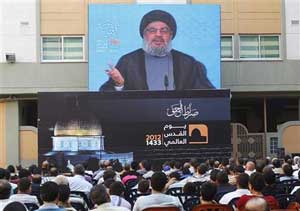04 Sep 2012 - {{hitsCtrl.values.hits}}
 Iran could hit U.S. bases in the Middle East in response to any Israeli strike on its nuclear facilities even if American forces played no role in the attack, the leader of Lebanon's Iranian-backed militant group Hezbollah said on Monday.
Iran could hit U.S. bases in the Middle East in response to any Israeli strike on its nuclear facilities even if American forces played no role in the attack, the leader of Lebanon's Iranian-backed militant group Hezbollah said on Monday.
18 Nov 2024 4 hours ago
18 Nov 2024 4 hours ago
18 Nov 2024 4 hours ago
18 Nov 2024 4 hours ago
18 Nov 2024 4 hours ago